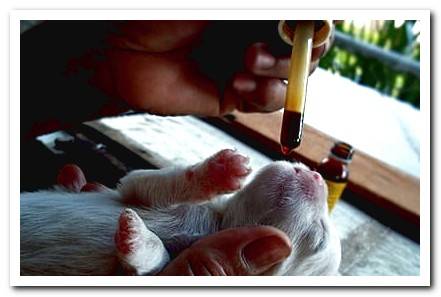
Knowing how internal parasites are transmitted and how to prevent them, is essential to prevent damage to our puppy and its spread to other dogs or people.
Unlike external parasites, such as fleas or ticks, internal parasites are generally located in the pet’s intestine, so we cannot see them with the naked eye and the diagnosis is made using a stool (stool) analysis.
Below, we will explain the guidelines to follow to prevent internal parasites in puppies from birth to adulthood.
Index of contents
- 1 What internal parasites can affect a newborn puppy?
- 2 How is a puppy infected with Toxocara Canis?
- 3 What symptoms does Toxocara canis produce in puppies?
- 4 How can we prevent internal parasites in puppies?
- 5 How do we internally deworm a pregnant bitch?
- 6 How do we deworm lactating puppies?
- 7 How do we deworm the puppies that are already out on the street?
What internal parasites can affect a newborn puppy?
Puppies less than 3 months old should not go outside, as they have not yet completed their vaccination protocol; and although this situation reduces the risk of contagion, it does not mean that they are 100% protected against internal parasites.
These puppies can become infected through their mother (if not properly dewormed) or if they come into contact with parasites present in the environment (We can carry parasite eggs in our shoes, clothes or hands if we have been in contact with other dogs, so it is very important to wash our hands before handling the puppies and take off the shoes with which we walk on the street when we reach House).
The main parasite that affects puppies before weaning is Toxocara canis, a type of roundworm (similar to spaghetti) that lodges in the intestine of infected dogs.
This parasite lays eggs that are released into the environment with the feces of parasitized animals, and if our dog ingests these eggs by smelling excrement from other dogs, she can become infected, being a high risk situation for her puppies, even before they are born.
Infection in adult dogs is unlikely to be associated with clinical signs, making it difficult to know if a dog is infected with Toxocara canis unless routine stool tests are done.

How is a puppy infected with Toxocara Canis?
During pregnancy, if the female is not dewormed properly and is a carrier of Toxocara canis, the larvae found in the intestine migrate to the placenta and mammary glands, infecting the cubs before they are born or during lactation.
Even if the main source of infection for newborn puppies will be their mother Remember that hygiene measures must be taken to prevent puppies from coming into contact with contaminated environments (shoes, hand washing …).
What symptoms does Toxocara canis produce in puppies?
Puppies less than 5 weeks old are especially sensitive to this parasite, since when they ingest their larvae, they cross the walls of the intestine and pass into the blood reaching the lungs. Through cough, they ascend to the mouth and are ingested reaching the stomach and intestine again to become definitively adult worms that will lay eggs that will be excreted with the faeces.
This migration by the lung does not usually occur in adult dogs, but in puppies of a few weeks it is an especially dangerous parasite, since it can cause pneumonia and even death.
The main symptoms that can be observed in an infected puppy are:
- Diarrhea
- Vomiting
- Gut bulge
- Cough and respiratory problems
- Weight loss and anemia
- Bad appearance of the coat
Upon observing any of these symptoms, we must urgently go to the vet with the puppy to establish a treatment that eliminates internal parasites and improves the associated symptoms.
How can we prevent internal parasites in puppies?
The best way to prevent infection in puppies is to the mother is properly dewormed before and during pregnancy / lactation.
There are specific products for deworming pregnant females (eg fenbendazole) and a deworming protocol must be followed. established and supervised by a veterinaryn.
IMPORTANT! Most of the products that are commonly used in deworming adult dogs are contraindicated in pregnant / lactating females, so do not supply any of these medications without first consulting a veterinaryn.

How do we internally deworm a pregnant bitch?
If we are going to cross our bitch on a scheduled basis, we must internally deworm it before mounting.
Towards the end of gestation, we must return to deworming (Administering Fenbendazole from day 40 of gestation prevents transmission to Toxocara Canis puppies).
Also recommended deworming the bitch during lactation (It must be treated at the same time as the first antiparasitic treatment of the litter).
How do we deworm lactating puppies?
If we do not know the health status of the mother and there is a possibility that she is a carrier of Toxocara canis and may have infected the puppies, we should carry out early deworming of puppies at 15 days of age with specific products (eg fenbendazole in syrup or paste). The treatment should be repeated every fortnight up to two weeks after weaning. Thereafter, monthly deworming will be performed up to 6 months of age.
If we have followed a correct preventive protocol for deworming the mother, we can delay the first internal deworming of the puppies until 4-6 weeks of age, prior to the time of the first vaccination.
How do we deworm the puppies that are already out on the street?
Once the vaccination protocol is finished, at around 3 months of age, the puppy can go outside and the range of internal parasites that can affect him is broader:
- Roundworms (Toxocara canis, Dirofilaria immitis …)
- Flat worms (Tenia spp., Equinococcus granulosus, Dipylidium caninum …)
Therefore, it is convenient to start use broad-spectrum dewormers that cover both roundworms and flatworms (eg milbemycin).
Regarding the frequency of deworming, My recommendation as a veterinaryn is to main
tain a monthly periodicity until 6 months of age and then go to internal deworming every 3 months for life.
It is recommended in high-risk scenarios (dogs living in a family with young children, with immunocompromised people or who have access to gardens or parks), to maintain the monthly frequency also in adulthood.
An alternative to deworming on a regular basis, would be to carry out monthly or quarterly stool tests, and only deworm our pet if it is infected.
